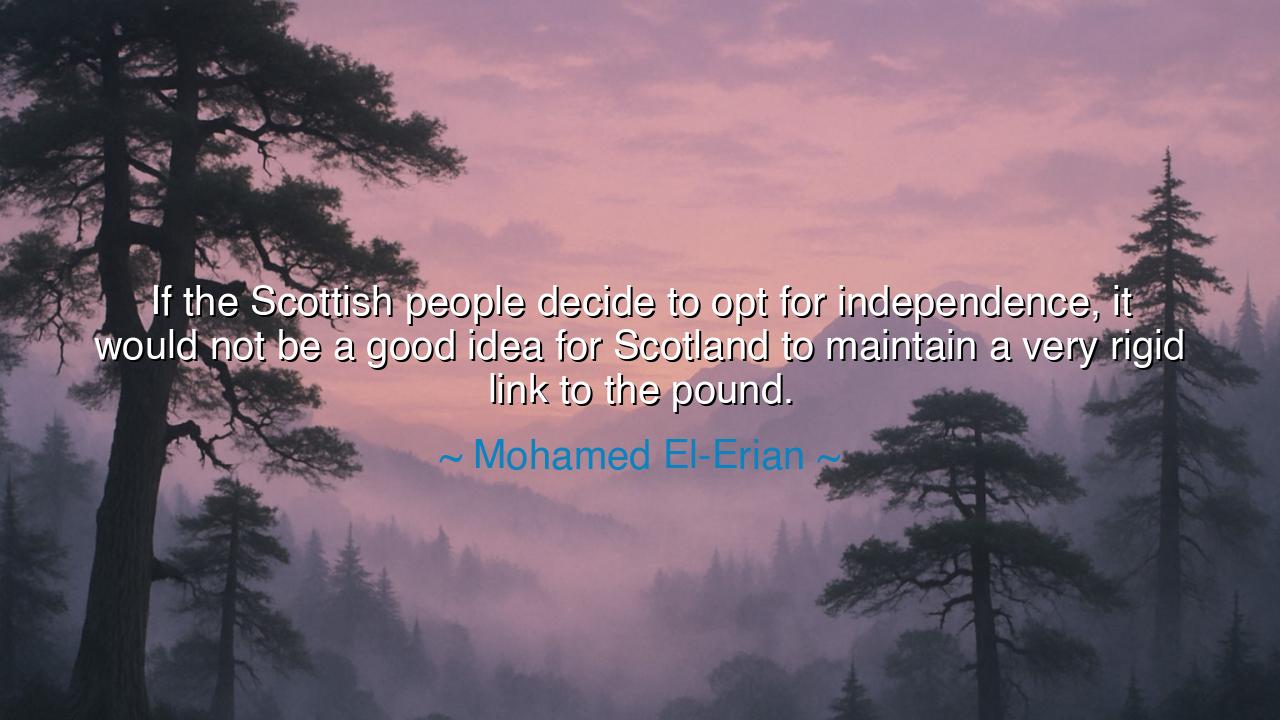
If the Scottish people decide to opt for independence, it would
If the Scottish people decide to opt for independence, it would not be a good idea for Scotland to maintain a very rigid link to the pound.






"If the Scottish people decide to opt for independence, it would not be a good idea for Scotland to maintain a very rigid link to the pound." – Mohamed El-Erian
Hear these words, O listeners of reason and foresight, for they come not from passion, but from the steady mind of Mohamed El-Erian, a scholar of markets and watcher of nations. In this reflection, he speaks not of politics, but of prudence — of the delicate balance between freedom and dependence, between the will of a nation to be sovereign and the unseen chains that may yet bind it through its currency. When El-Erian warns that it is unwise for Scotland, in seeking independence, to hold too tightly to the pound, he speaks to an eternal truth: that one cannot be truly free if one’s foundations still rest upon another’s power.
The meaning of his words stretches beyond economics. To bind one’s new destiny to the tools and systems of the old is to remain half-tethered to the past. True independence — whether of a nation or a soul — requires not only the declaration of freedom, but the courage to bear its weight. The pound, symbol of British unity and economic stability, is here more than a coin; it is a metaphor for dependence. To cling to it after choosing separation would be to declare independence in name, but not in spirit. Thus, El-Erian’s counsel is not one of politics, but of philosophy: that liberty without self-sufficiency is but illusion.
The origin of this warning lies in the debates surrounding the Scottish Independence Referendum of 2014, when the question of currency loomed as large as that of borders. Many advocates of independence proposed that Scotland could still use the British pound, even after separating from the United Kingdom. Yet El-Erian, an economist versed in the storms of finance, foresaw the danger in such a bond. For to depend upon another nation’s money is to surrender control over one’s economic destiny. A country that cannot guide its own interest rates or shape its fiscal course remains, in truth, only half-sovereign. His words, then, were not against freedom, but for a complete and sustainable independence, one that could weather both triumph and trial.
History offers echoes of this wisdom. Consider the newly freed American colonies, who, after breaking from Britain, faced chaos in their own currency. At first, they clung to the pound and foreign loans, their economy trembling under the weight of debts. It was only when they forged their own financial system — with the creation of the U.S. dollar — that their freedom took root not only in politics, but in practice. Independence, they learned, must be built upon economic autonomy, for the purse is the heart of power. A nation may wave its flag in the wind, but if it must seek permission to spend or borrow, it remains under another’s shadow.
El-Erian’s insight also touches the inner life of individuals. For just as nations must free themselves from dependency, so must men and women learn to stand upon their own means and convictions. To seek freedom while still relying upon another’s approval or resources is to build a kingdom upon sand. The same principle governs both realms — political and personal. True independence demands both courage and sacrifice: the courage to risk hardship for self-rule, and the sacrifice of comfort for dignity.
Yet his tone is not cold, but compassionate. El-Erian does not scorn Scotland’s dream of sovereignty; rather, he urges it toward wisdom. He knows that freedom gained without foresight can lead to ruin — that every declaration of independence must be followed by the hard work of building systems strong enough to sustain it. He speaks as the ancients would have spoken to young nations: “If you would be free, learn first to govern yourself.” For liberty without preparation is like a ship without a rudder — destined to drift wherever the winds of others may blow.
So let this lesson be engraved upon the minds of those who dream of independence, whether of nations or of souls. Freedom is not merely the breaking of chains; it is the mastery of one’s own course. To cast off one’s bonds is brave, but to build anew upon one’s own strength is divine. As El-Erian teaches, independence without control is but a new form of captivity. Therefore, let every people — and every person — who seeks freedom also seek wisdom, for only in wisdom does liberty endure. And when the moment comes to choose between the comfort of dependence and the risk of sovereignty, may they remember this truth: that the path of independence, though steep and uncertain, leads always toward the summit of dignity.






AAdministratorAdministrator
Welcome, honored guests. Please leave a comment, we will respond soon